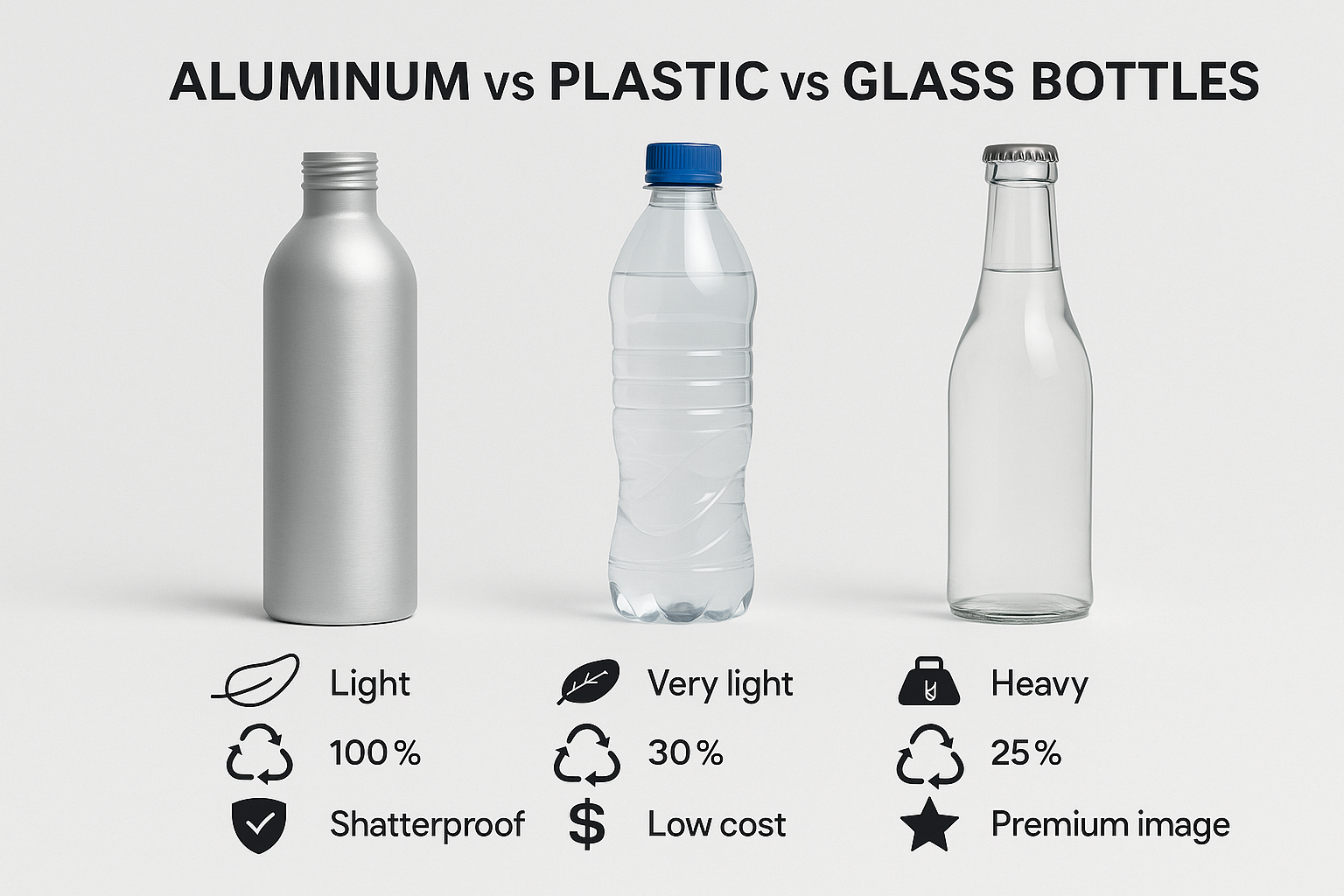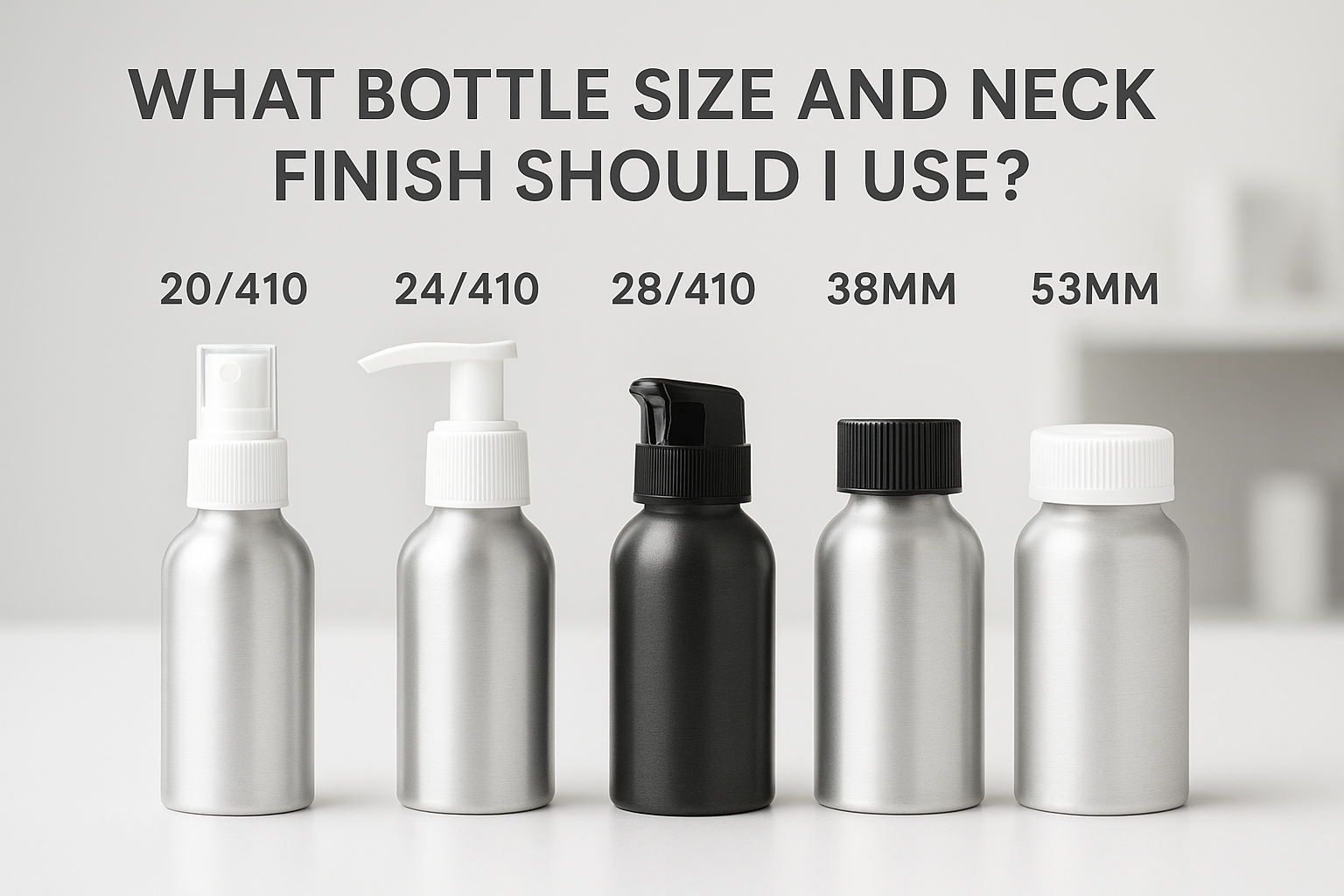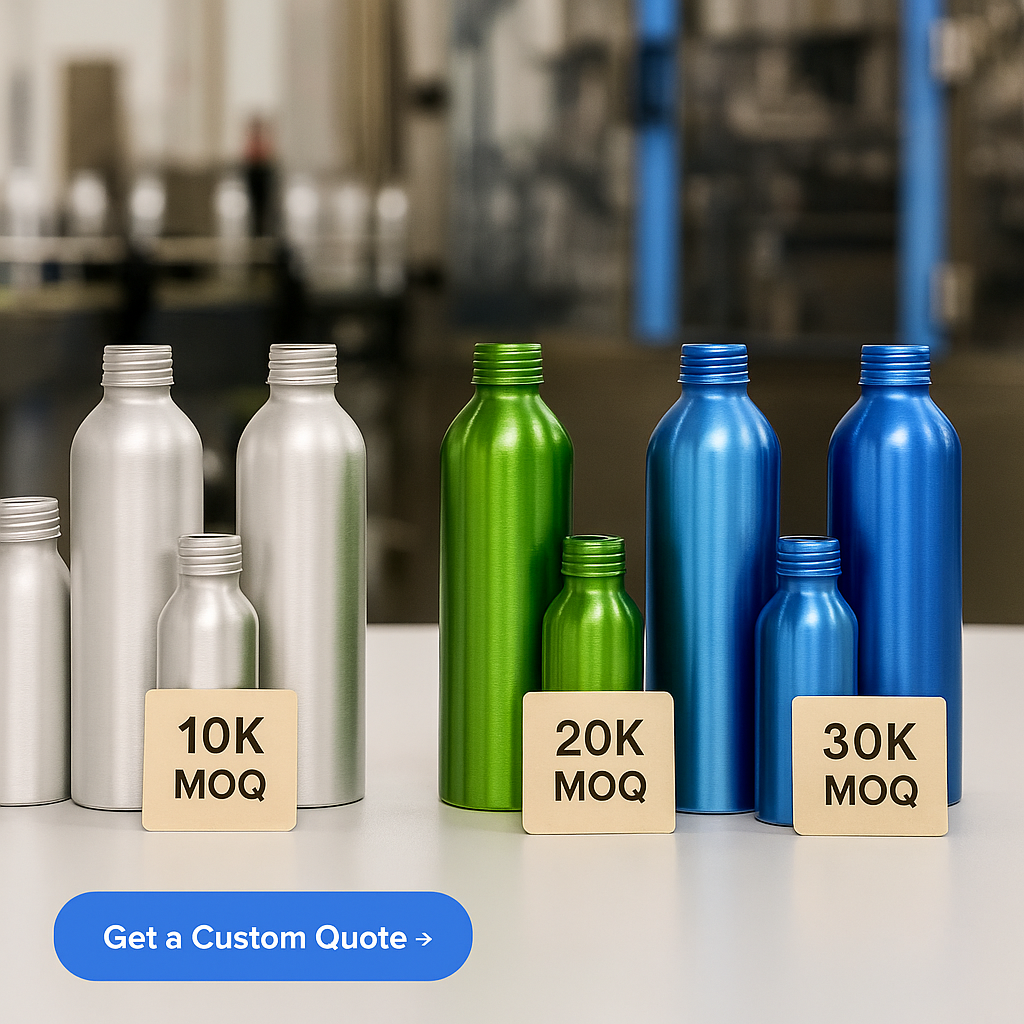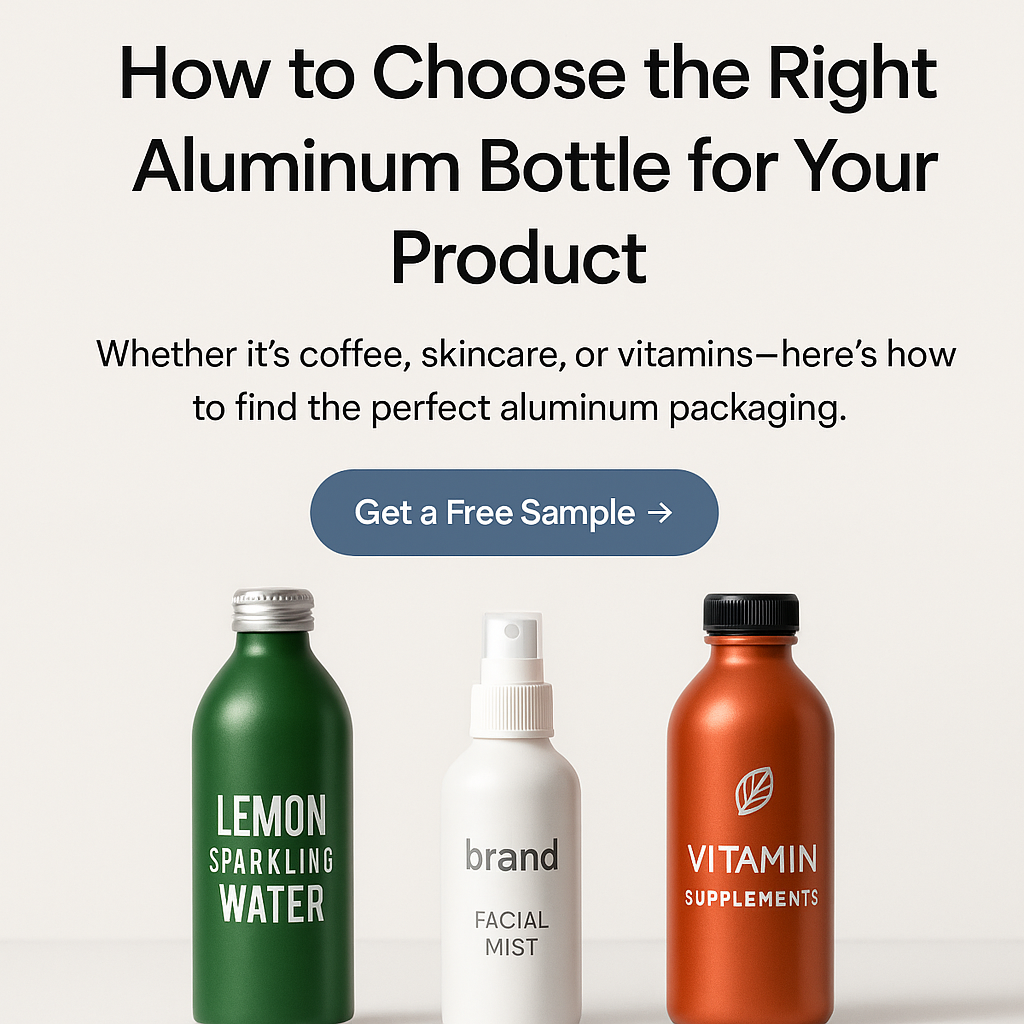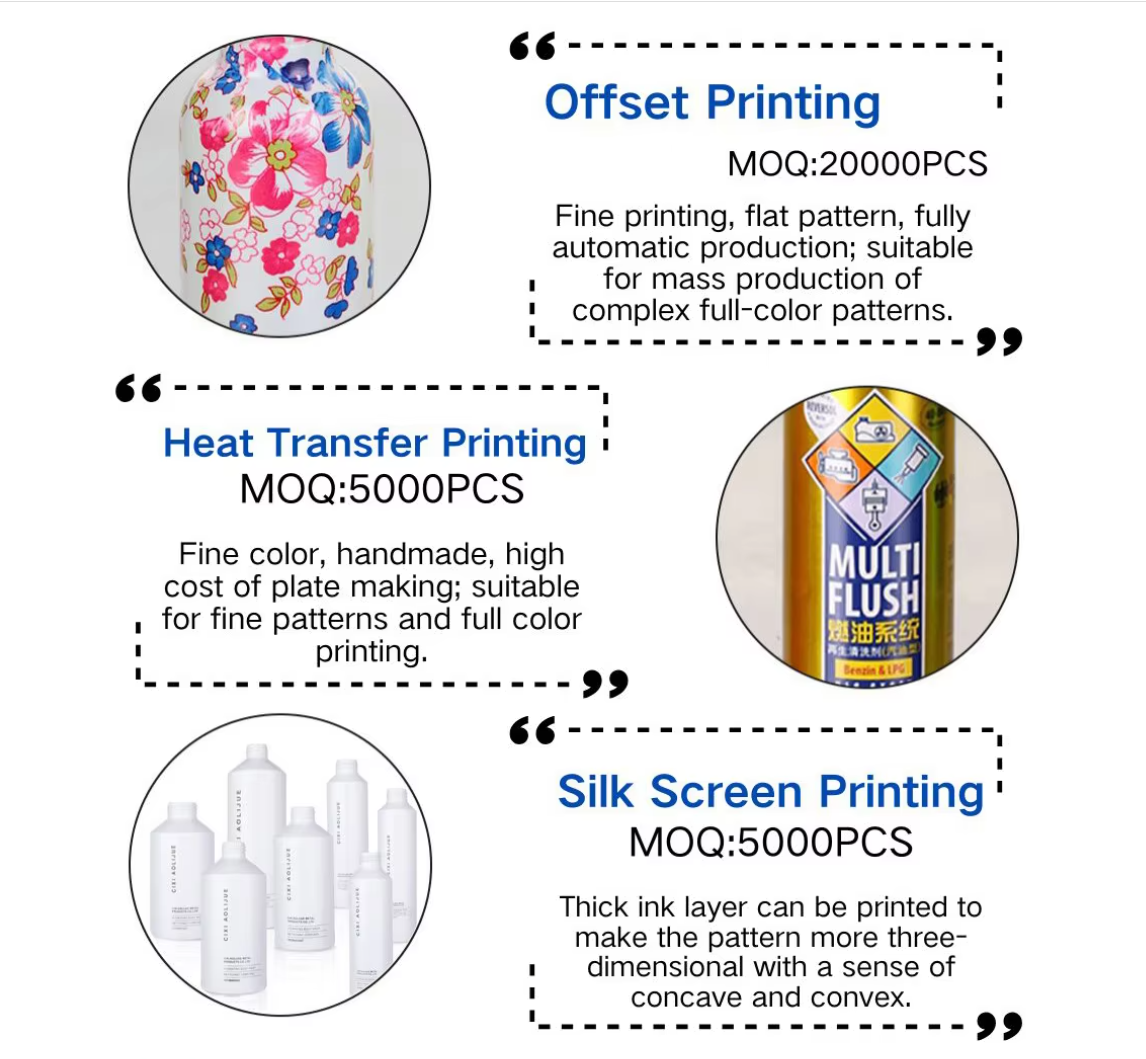
Have you ever wondered if aluminum bottles are the eco-friendly packaging game-changer we've all been waiting for?
Aluminum bottles bring several benefits to the table, like being highly recyclable, incredibly durable, and boasting a sleek design that speaks to eco-conscious folks. On the flip side, there are downsides, including the risk of chemical leaching and higher production costs compared to plastic or glass. Weighing these pros and cons can help you make smarter packaging choices.
While I've just skimmed the surface of aluminum bottles' perks and pitfalls, it's worth digging deeper into how they measure up against materials like plastic and glass. Understanding what's trending in the industry and what consumers are leaning towards can really shape your decision, whether you're choosing for yourself or your business.
Aluminum bottles are 100% recyclable.True
Aluminum can be recycled indefinitely without losing quality, making it highly sustainable.
Aluminum bottles are cheaper than plastic.False
Aluminum is generally more expensive to produce and purchase than plastic.
How Does Aluminum Compare to Plastic and Glass in Packaging?
Have you ever paused to wonder about what goes into choosing the right packaging material? It’s more than just a box or a bottle.
Aluminum, plastic, and glass each offer unique advantages for packaging. Aluminum is lightweight and recyclable, plastic is versatile and cost-effective, while glass is durable and inert. The choice depends on specific needs like environmental impact, cost considerations, and product protection.
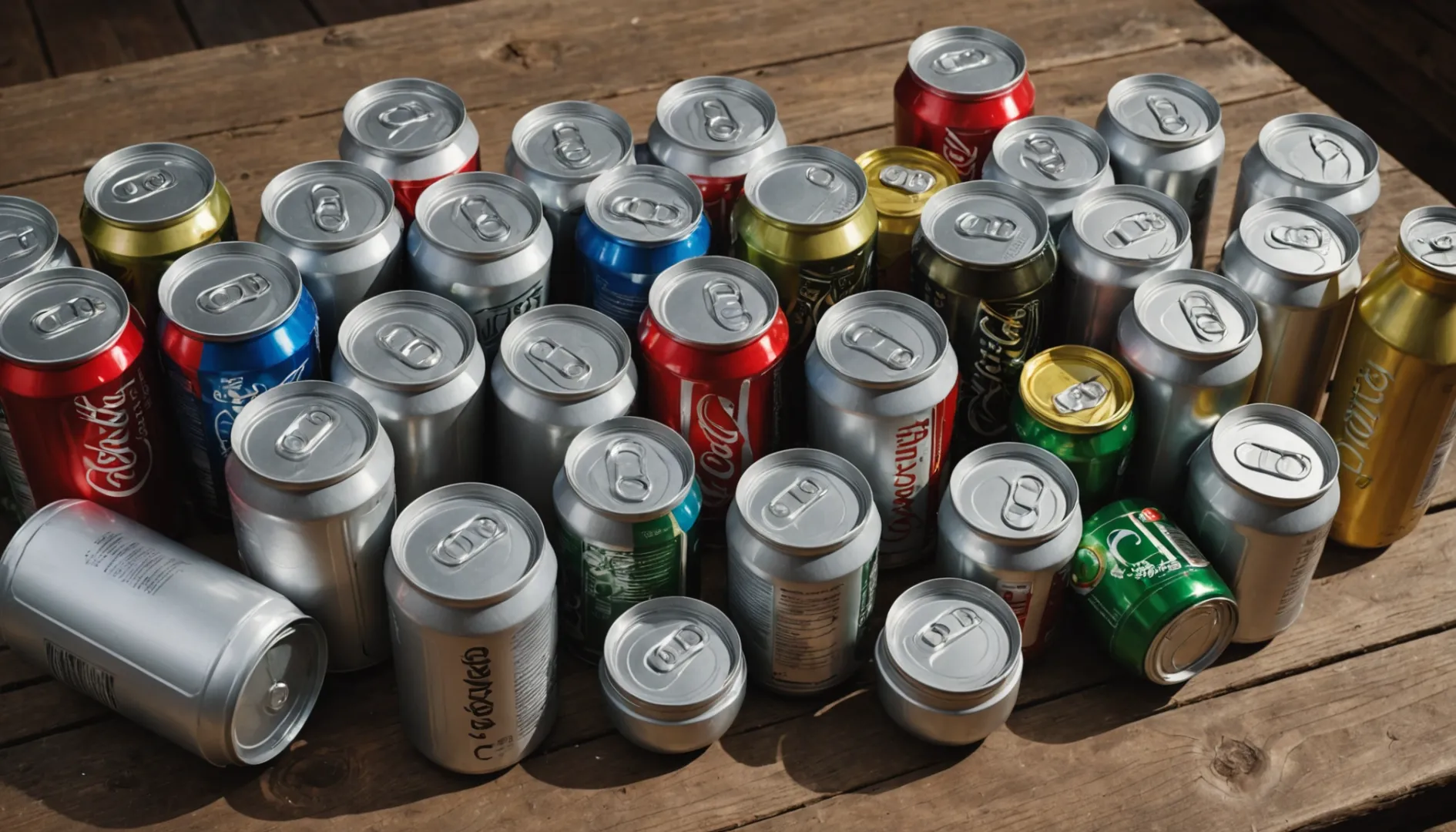
Sustainability Factors
I remember the first time I learned about recycling: I was sorting cans with my grandmother. She was passionate about recycling, emphasizing how 75% of all aluminum ever produced is still in use today! That fact blew my mind. Aluminum can be recycled endlessly without losing quality, making it a superstar in sustainable packaging. However, its production process demands a lot of energy, which might not sit well with everyone who's eco-conscious.
Plastic, though cheap and versatile, has always been a bit of a puzzle when it comes to recycling. Despite its widespread use, only a small percentage gets properly recycled, mainly because of contamination and the wide array of plastics involved. However, it's exciting to see advancements in plastic recycling methods1, giving us hope for better solutions.
Glass was another story my grandmother loved sharing: it's 100% recyclable and doesn’t degrade over time. Yet, its weight can be its downfall since it ramps up transport emissions, slightly tarnishing its green credentials.
Cost Considerations
From my experience, plastic tends to be the go-to when budgets are tight—its low production costs make it a favorite for mass production. On the flip side, aluminum might seem pricier initially but could lead to savings down the line due to its recyclability and durability.
Glass often turns out to be the most expensive choice because of high production and transportation costs. This can be quite a hurdle for industries where cutting costs is crucial.
Health Implications
When it comes to health, I’ve noticed many friends prefer glass packaging for their food and drinks because it’s inert and doesn’t interact with contents. Aluminum also ranks high on the safety list when lined properly to avoid chemical reactions with acidic foods.
Plastic's safety can be tricky. Some types are perfectly safe for food contact, while others might leach harmful chemicals. So, it’s vital to choose food-safe plastics2 when health is a top concern.
Ultimately, picking the right material for packaging is like crafting a recipe: it’s all about balancing sustainability, cost, and health priorities. Whether you’re drawn to the eco-friendliness of aluminum, the budget-friendliness of plastic, or the purity of glass, each offers unique perks worth considering.
Aluminum is more recyclable than plastic and glass.True
Aluminum can be recycled indefinitely without losing quality, unlike plastic.
Glass packaging is lighter than aluminum and plastic.False
Glass is heavier than both aluminum and plastic, affecting transport costs.
What Are the Environmental Impacts of Aluminum Bottles?
I once stood in the supermarket aisle, aluminum bottle in hand, pondering its environmental impact.
Aluminum bottles, often touted as eco-friendly, indeed boast a lower environmental impact than single-use plastics due to their recyclability and reduced carbon footprint. However, the ecological harm from bauxite mining cannot be ignored. Understanding these factors helps us make informed and sustainable choices.

The Lifecycle of Aluminum Bottles
When I first learned about the journey of an aluminum bottle, I was surprised. It begins in bauxite mines where the extraction processes can wreak havoc on ecosystems, causing deforestation and water pollution. This was a real eye-opener because while I was drawn to aluminum for its eco-friendly image, these hidden costs challenged that perception. But here's the silver lining—aluminum's recyclability. Once made, it can be recycled over and over without losing quality, dramatically cutting down the need for more raw materials. A few years ago, I found a study3 stating that recycling aluminum saves up to 95% of the energy compared to producing new aluminum from ore. That statistic stuck with me because it highlights the potential positive impact of choosing aluminum over other materials.
Carbon Footprint Considerations
Thinking about carbon footprints can be a bit daunting. Still, I remember when I decided to switch to aluminum bottles for my daily hydration needs. Producing aluminum is energy-intensive, yet it turns out to have a lower carbon footprint than plastic when considering multiple life cycles due to its recyclability. Plus, its weight impacts transportation emissions—lighter than glass but heavier than plastic. Some research4 I read suggested that although producing and recycling aluminum consumes energy, its long-term benefits make it worthwhile.
Comparing with Other Materials
In my quest to live more sustainably, I've often compared aluminum with plastic and glass. Each has unique pros and cons. Plastic bottles are lightweight and cheap, but their poor recycling rate is a significant drawback, leading to more waste. Glass is entirely recyclable and inert but heavier, which ramps up transportation emissions. A comprehensive comparison5 I encountered showed that while aluminum's recyclability is a big plus, each material has its own set of environmental challenges.
Consumer Choices and Sustainability
It's empowering to realize how much consumer choices can drive sustainability. By opting for aluminum over single-use plastics, I feel like I'm contributing to a cycle that encourages better recycling systems due to high demand. But I've learned that understanding mining practices6 is crucial for making informed decisions. Supporting brands that prioritize responsible sourcing and use recycled materials can significantly reduce the environmental footprint of aluminum products. This knowledge has shaped my purchasing habits, reminding me that every choice counts towards a more sustainable future.
Aluminum bottles are infinitely recyclable.True
Aluminum can be recycled repeatedly without losing quality, unlike plastic.
Producing aluminum bottles emits less CO2 than glass.False
Glass production typically emits less CO2 compared to aluminum due to lower energy requirements.
Are There Health Concerns Associated with Aluminum Packaging?
Ever wondered if the aluminum packaging keeping your snacks fresh might be doing more harm than good? Let's uncover the truth.
Aluminum packaging can leach into food, especially acidic items, posing potential health risks. Though no direct link to diseases like Alzheimer's is proven, it's wise to limit exposure by choosing alternative storage options.

Understanding Aluminum Exposure
Aluminum is a versatile material, found in everything from beverage cans to food trays. However, when it comes to food packaging7, concerns arise about aluminum migrating into the food we consume. This migration is particularly noted in acidic foods, which can dissolve aluminum more readily.
Despite its prevalence, scientific research has yet to establish a definitive link between aluminum exposure from packaging and severe health issues such as Alzheimer's disease. The World Health Organization (WHO) acknowledges aluminum as a neurotoxin at high doses but emphasizes that regular dietary exposure typically remains within safe limits.
Studies and Findings
Research into the health implications of aluminum has produced mixed results. Some studies suggest a potential correlation between high aluminum levels and neurodegenerative diseases, while others find no significant evidence. For instance, a study in the journal NeuroToxicology explored the potential role of aluminum in Alzheimer's but found no conclusive results.
Nevertheless, ongoing studies continue to examine the long-term effects of aluminum exposure from various sources8, including packaging.
Reducing Aluminum Exposure
To mitigate potential risks, consumers can opt for alternatives such as glass or stainless steel for food storage, especially for acidic or hot items that may increase aluminum leaching.
Furthermore, the use of protective coatings inside aluminum cans and containers can significantly reduce the likelihood of migration. These coatings act as a barrier, preventing direct contact between the food and the metal.
For those concerned about environmental impacts alongside health, choosing packaging that balances both considerations is essential.
While current evidence doesn't definitively state that aluminum packaging poses severe health risks, exploring alternatives and staying informed on emerging research9 can guide safer choices in food storage and consumption.
Aluminum packaging increases Alzheimer's risk.False
No conclusive evidence links aluminum packaging to Alzheimer's disease.
Aluminum can leach into food at high temperatures.True
High temperatures can cause aluminum to leach into acidic foods.
Why Are Aluminum Bottles Trending in the Market?
Have you ever wondered why everyone seems to be reaching for aluminum bottles lately? It's not just about their shiny exterior; there's more to this trend than meets the eye.
Aluminum bottles are trending because they are sustainable, recyclable, and excellent at preserving product quality. They provide a strong and eco-friendly alternative to plastic and glass packaging.

Sustainability and Environmental Impact
I remember the first time I really thought about my carbon footprint—it hit me like a ton of bricks. Seeing pictures of plastic waste cluttering the oceans pushed me to find more sustainable choices. That's where aluminum bottles come in. Unlike plastic that lingers for centuries, aluminum is infinitely recyclable, making it a superstar for companies wanting to slash their carbon emissions. Did you know that recycled aluminum uses 95% less energy than producing it from scratch? That's a win for the planet! Learn more about environmental benefits10.
Consumer Preference Shift
We've all noticed the shift, haven't we? More and more of us are choosing brands that match our values, especially when it comes to sustainability. I remember chatting with a friend who mentioned she felt good buying products in aluminum bottles because they look chic and align with her eco-conscious lifestyle. Many brands have caught on to this trend and seen a boost in customer loyalty because of it.
Today's consumers are more environmentally conscious than ever before. They prefer products that align with their values, including sustainable packaging solutions. Aluminum bottles not only meet this demand but also offer a sleek, modern design that appeals to a wide audience.
Durability and Product Preservation
Aluminum bottles have been a game-changer in my house. With kids running around, I've had one too many shattered glass bottles. Aluminum stands up to the chaos, protecting everything inside from light, oxygen, and moisture. Plus, the safety aspect—no shards to worry about—is a huge relief.
Aluminum bottles are known for their durability11, offering excellent protection against light, oxygen, and moisture. This helps in preserving the quality of the product inside.
Health Concerns and Misconceptions
There was a time when I hesitated about aluminum bottles, worried about potential health risks. But most are lined with BPA-free coatings, ensuring nothing harmful gets into the products we use. It’s reassuring knowing that while I’m being eco-friendly, I’m not compromising on safety or quality.
Despite these benefits, some consumers worry about potential health risks associated with aluminum exposure; however, most aluminum bottles are lined with BPA-free coatings to prevent any interaction between the metal and the product.
Brand Strategies and Market Dynamics
Brands have become savvy, haven't they? They're not just switching to aluminum for its looks or durability; they’re leveraging its marketing potential too. By going green with aluminum packaging, brands are setting themselves apart in crowded markets and becoming leaders in sustainability.
Companies are increasingly adapting their strategies12 to incorporate aluminum packaging due to its marketing appeal and sustainability credentials.
Aluminum bottles are more recyclable than plastic ones.True
Aluminum is infinitely recyclable, unlike plastic, which degrades.
Aluminum bottles pose significant health risks to consumers.False
Aluminum bottles are generally safe and widely used in packaging.
Conclusion
Aluminum bottles offer eco-friendly packaging with high recyclability and durability but face challenges like chemical leaching and higher production costs compared to plastic and glass.
-
Discover recent innovations improving plastic recycling efficiency and sustainability. ↩
-
Learn about plastics that are safe for storing food and beverages. ↩
-
Learn how recycling aluminum significantly conserves energy resources. ↩
-
Discover how aluminum's carbon footprint compares with plastic over time. ↩
-
Explore a detailed comparison of glass, plastic, and aluminum impacts. ↩
-
Understand the ecological effects of bauxite mining activities. ↩
-
Explore how aluminum interacts with different food types. ↩
-
Discover scientific insights on aluminum packaging's health impact. ↩
-
Stay updated with new findings on aluminum health effects. ↩
-
Learn why aluminum's recyclability makes it a top sustainable choice. ↩
-
Discover how aluminum enhances durability and product safety. ↩
-
Explore how companies leverage aluminum for market advantage. ↩

